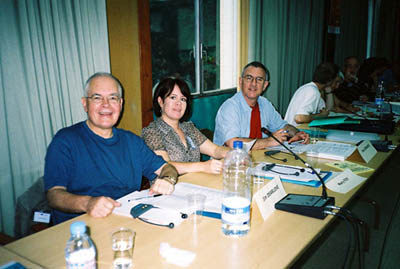|
 Jim Dearlove, Mary Foy and Paul Edwards in Barcelona
The
MCW's NEC had prepared the English delegates' contribution to the
questions posed for discussion. These included ‘What is the situation
of migrants in your country?'; ‘Are people afraid of any of these
groups?'; ‘How does your government tackle the view of migrants?' and
‘What is the response of the Church in your country to migrants?'Our
preparation included noting that England had been a country of
migration and settlement throughout its history. We also identified
both the positives and negatives attributed to migration including the
gaining of skills and sharing cultures whilst difficulties arose
because of the strain put on current infrastructure not developed to
meet the new demands of changing needs. The Catholic Bishops'
Conference Policy Paper ‘Mission of the Church to Migrants in England
& Wales' as well as our past enquiries on the Gospel's provocation
to welcome and be in solidarity with the widow, the stranger and the
orphan assisted us in our contribution to the seminar's deliberations.
In addition the MCW's responsibility for providing the Saturday Morning Spiritual Over
4 days of open sessions and group discussions the main focus of their
deliberations was ‘Migration & Mobility (legal and illegal) of
Workers in Europe'. This seminar was a follow-up from the Seville
Declaration on Migration in Europe which was written in May 2007 at
which Liz Meagher and Jim Dearlove were present.
Reflection
focused on this challenge using readings from Deuteronomy 10:18-19;
Luke 10:25-37 as well as part of a verse written from a migrant's
perspective entitled ‘Home is home & bush is bush' from
‘Celebrating One World' booklet.
Arising out of the various discussions and presentations our delegation made three particular reflections:
-
Although
we were examining migration from a European perspective its worldwide
context could not be ignored. Whilst some European countries spoke of
the difficulties of hosting migrants it was important to remember that
much poorer African countries were hosting most of the world's
population of migrants.
-
Much
of the tension and struggle within our countries arose because our
governments were failing to address the poverty and hardshipsuffered,
many over generations, by our indigenous and settled communities
whether in paid employment or without work.
-
The
governments of those countriesfrom where people were migrating had to
take responsibility for their own policies instead of turning a blind
eye to the circumstances of their communities.
Whilst
these contextual issues remained unaddressed people who struggled and
endeavoured to keep themselves and their families alive, fed, housed
and in health in whatever and however way they could would remain the
victim, the individual to be blamed.
The
French and Portuguese delegations brought to our attention the moves
afoot for the European Commission to ‘harmonise legislation' on illegal
migration. This they emphasised was not to protect people's human
rights but to simply improve the effectiveness of expulsion. What this
included was a proposal to hold people in detention as a control i.e.
an internment of migrants - an approach which runs contrary to the values founded through the reconstruction of Europe in the wake of the 2nd
World War. Thus they called upon the MEPs to refuse to vote in favour
of this move so as to defend the fundamental values and liberty of
people. With elections for our MEPs coming soon perhaps this is one
question to be posed; where do they stand on internment for migrants?
The
Barcelona Declaration, a document produced as a fruit of the various
and wide ranging discussions from the seminar will be available soon.
Don't forget to look for it on the MCW website www.mcworkers.org
|

